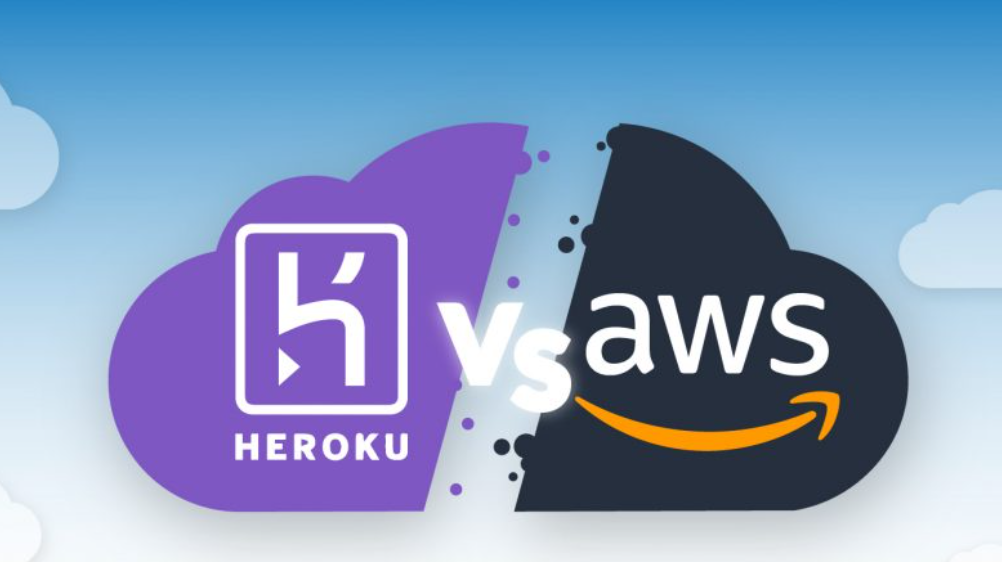Cloud-based platforms are getting more and more recognition these days in the business world. By using cloud-based solutions, businesses can focus on planning and execution instead of dealing with other unnecessary stuff.
But as the demand increases in the cloud solution, various companies have started providing their cloud solution. There are various cloud solutions available in the market, and it becomes very typical to find the best one.
In this blog, we will be discussing two Cloud Services, Heroku, and AWS. We will go through their benefits and drawbacks, and we will also discuss how to choose the right solution that fits your project.
Both help us to deploy, monitor, and scale web and mobile apps by providing us cloud computing resources, and they are also great for hosting applications.

Top Reasons To Choose Cloud-Based Solutions
Before we start discussing the AWS and Heroku technologies, let us first discuss why companies should use Cloud Services?
- Flexibility: Cloud technologies allow businesses to manage their data in multiple ways and make business operations more flexible.
- Ease of Access: Cloud services ensure that the company’s employees have easy access to the data. It provides the feasibility to edit or even change the files from anywhere.
- Backup Functionality: While using a cloud platform, organizations do not have to worry about the safety of the data. Data is collected on fully secured servers.
What’s AWS?
There are various giants, such as Airbnb, Ubisoft, Spotify, and Foursquare that are using AWS as a cloud services platform.
AWS is an IaaS platform having dozens of services, which help users to deal with analytics, database, deployment, and hundreds of other tasks along. The platform also offers flexible, consistent, scalable, easy-to-use, and cost-effective cloud computing solutions.
Types of AWS Services
- Amazon Simple Storage Service (S3)
- Elastic Compute Cloud (EC2)
- AWS Lambda
What is Heroku?
Heroku is serving as a Platform as a Services (PaaS) product, based on AWS. It makes the development and deployment process much efficient and effective.
Once the developers are done with the app development process and send it to Heroku Cloud, the tool automatically configures the infrastructure and the resources provisioning where the app is deployed i.e. AWS. Heroku serves as a platform for developers where they can place where they can build, deploy, and scale their apps.
Difference b/w Heroku and AWS
There are a couple of things, which you need to keep in mind before you understand the difference between AWS and Heroku solutions. Let go through the main differences b/w AWS and Heroku.
Types of Business
If you are running a small business, then Platform as a Services solution(PaaS) will be the best option for you, as it provides ready-made tools that you can use just the settings, and the rest will be taken care of by the PssS solution.
If you are running a big business, then you should go with IaaS. It involves the manual configuration of the server and the app. If you are planning to launch a large scale app, and have access to high-quality app development services, then you can choose IaaS. By using it, the development team can manage building blocks of the project as the business grows.
Costing
AWS is a better choice if you are on a tight budget. The hourly prices start from $0.011/hr. Talking about the Heroku technology, it offers six dyno types with 14GB of memory, which cost around $500 per month.
Below is the price comparison b/w AWS and Heroku:
- AWS: t3.micro (1GiB) – $0.0104 per hour ($7.48 per month)
- Heroku (Dyno): standard-2x (1024MB) ($50.00 per month)
- AWS: c5.2xlarge (16GiB) – $0.34 per hour ($244.8 per month)
- Dyno: performance-l (14GB) ($500.00 per month)
Deployment Speed
Both the technologies – AWS and Heroku, skyrocket the development process in an effective way, and they both provide the insight option to keep track of the app’s workability.
On the plus side, Heroku provides a ready-to-use environment, where you only need to enter the code, make a few changes, and start running the app. Also, you can migrate and run apps much faster in comparison to AWS.
Why use AWS?
Advantages of AWS:
- Great scalability
- Abundance of features
- Easy to create a new server
Cons of AWS:
- Knowing the basics of Unix administration is necessary or
- You will need to hire a developer experienced with Amazon AWS
Ease of usage: from medium to advanced
Why use Heroku?
Advantages of Heroku:
- Create a new server in 10 seconds using Heroku Command Line
- Deployment is done with Git Push
- Lots of add-ons
Cons of Heroku:
- Requires deployment with Git
- No automated scalability
Ease of usage: for beginners
Which is better for your business? Heroku vs. AWS
We’ve reviewed both cloud solutions and defined their main differences. Let’s find out which one will work for your project.
Use AWS if:
- You would like to work in a flexible infrastructure
- You haven’t deployed the app yet
- You must have a Development Engineers at your service
- You need to spend time on deploying the new version of your app
- The project requires vast computing power
Consider Heroku if:
- You want to develop, deploy and test an MVP app.
- You will continuously upgrade your app based on customers’ reviews
- You do not require a Development engineers in the team
- The project doesn’t require huge computing power
Summary!
As you see, both AWS and Heroku are great cloud-based solutions but are different in certain key areas. That’s why it’s essential to understand that each feature matters when it comes to choosing the best cloud platform for your app.
If you are still confused about choosing between the two, then don’t worry, you can always switch between AWS or Heroku in case you want to change a hosting plan or your app demands a custom infrastructure. Still, between Heroku vs. AWS, it’s always best to start with the best-fitting solution right away.








